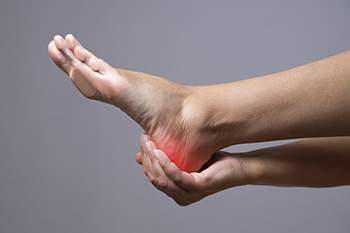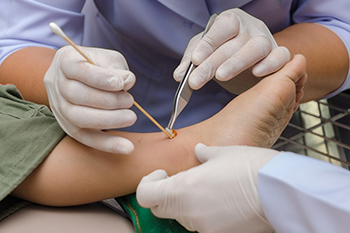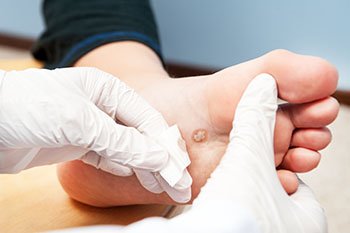Copyright © Michigan Foot and Ankle | Site Map | Nondiscrimination Policy | Design by: Podiatry Content Connection
February 2023
Heel Pad Syndrome

There are several reasons why heel pain can develop, and one cause is heel pad syndrome. While heel pads break down due to normal use and aging, excessive wear and tear or injury can cause the heel pads to shrink in size. This condition can also result from obesity, other health or foot conditions, or from wearing poorly cushioned shoes. Heel pads are like shock absorbing cushions in the heels. They are composed of fat and flexible, but tough fibers. They not only absorb shock from the impact of standing and mobility, they help to distribute the body weight and protect the bones and joints in the foot. With this syndrome, the heel pads lose their elasticity and shock-absorbing capacity, and severe pain in the middle of the heel can develop. It can feel similar to a bad bruise without being visible. The good news is that this is a treatable condition which may improve with exercise. Since it is difficult to distinguish one cause of heel pain from another, it is suggested that you visit a podiatrist for a proper diagnosis and treatment for your particular heel pain.
Many people suffer from bouts of heel pain. For more information, contact one of our podiatrists of Michigan Foot and Ankle. Our doctors can provide the care you need to keep you pain-free and on your feet.
Causes of Heel Pain
Heel pain is often associated with plantar fasciitis. The plantar fascia is a band of tissues that extends along the bottom of the foot. A rip or tear in this ligament can cause inflammation of the tissue.
Achilles tendonitis is another cause of heel pain. Inflammation of the Achilles tendon will cause pain from fractures and muscle tearing. Lack of flexibility is also another symptom.
Heel spurs are another cause of pain. When the tissues of the plantar fascia undergo a great deal of stress, it can lead to ligament separation from the heel bone, causing heel spurs.
Why Might Heel Pain Occur?
- Wearing ill-fitting shoes
- Wearing non-supportive shoes
- Weight change
- Excessive running
Treatments
Heel pain should be treated as soon as possible for immediate results. Keeping your feet in a stress-free environment will help. If you suffer from Achilles tendonitis or plantar fasciitis, applying ice will reduce the swelling. Stretching before an exercise like running will help the muscles. Using all these tips will help make heel pain a condition of the past.
If you have any questions please contact one of our offices located in Ferndale, and Milford, MI . We offer the newest diagnostic and treatment technologies for all your foot and ankle needs.
Wound Care on Children’s Feet

Wounds that develop on the feet ought to be taken care of as soon as possible. Ignoring these wounds could make the onset of infections more likely. Importantly, if you are a parent of a young child, you should be aware of the possibility of wounds developing on your child’s feet. Children are susceptible to developing wounds on the feet for many reasons. Most importantly, children are engaged in many types of physical activities throughout the day, such as on the playground or in gym class, and this can make them susceptible to developing such wounds. When your child does develop one of these wounds, it can be useful to remember to wash your hands before and after touching the wound. Also, when treating your child’s foot wound, you might do your best to keep the dressing around the wound dry. If a wound persists or worsens, it is suggested that you contact a podiatrist for guidance.
Wound care is an important part in dealing with diabetes. If you have diabetes and a foot wound or would like more information about wound care for diabetics, consult with one of our podiatrists from Michigan Foot and Ankle. Our doctors will assess your condition and provide you with quality foot and ankle treatment.
What Is Wound Care?
Wound care is the practice of taking proper care of a wound. This can range from the smallest to the largest of wounds. While everyone can benefit from proper wound care, it is much more important for diabetics. Diabetics often suffer from poor blood circulation which causes wounds to heal much slower than they would in a non-diabetic.
What Is the Importance of Wound Care?
While it may not seem apparent with small ulcers on the foot, for diabetics, any size ulcer can become infected. Diabetics often also suffer from neuropathy, or nerve loss. This means they might not even feel when they have an ulcer on their foot. If the wound becomes severely infected, amputation may be necessary. Therefore, it is of the upmost importance to properly care for any and all foot wounds.
How to Care for Wounds
The best way to care for foot wounds is to prevent them. For diabetics, this means daily inspections of the feet for any signs of abnormalities or ulcers. It is also recommended to see a podiatrist several times a year for a foot inspection. If you do have an ulcer, run the wound under water to clear dirt from the wound; then apply antibiotic ointment to the wound and cover with a bandage. Bandages should be changed daily and keeping pressure off the wound is smart. It is advised to see a podiatrist, who can keep an eye on it.
If you have any questions, please feel free to contact one of our offices located in Ferndale, and Milford, MI . We offer the newest diagnostic and treatment technologies for all your foot care needs.
Clusters of Plantar Warts

Plantar warts are often confused with other kinds of foot conditions such as corns. However, plantar warts are importantly different from corns, and anyone who cares about maintaining the health of their feet ought to be familiar with what is unique about them. Plantar warts are growths on the feet that are ultimately caused by the human papillomavirus. These growths sometimes can be painful. Plantar warts can, in fact, grow in clusters. However, they do not necessarily do so. These clusters of plantar warts on the bottoms of the feet can present themselves as groupings of warts. Clusters can also form on one or both feet at a time. If you are someone that has plantar warts, contact a podiatrist today to learn more and to receive treatment.
Plantar warts can be very uncomfortable. If you need your feet checked, contact one of our podiatrists from Michigan Foot and Ankle. Our doctors will assist you with all of your foot and ankle needs.
About Plantar Warts
Plantar warts are the result of HPV, or human papillomavirus, getting into open wounds on the feet. They are mostly found on the heels or balls of the feet.
While plantar warts are generally harmless, those experiencing excessive pain or those suffering from diabetes or a compromised immune system require immediate medical care. Plantar warts are easily diagnosed, usually through scraping off a bit of rough skin or by getting a biopsy.
Symptoms
- Lesions on the bottom of your feet, usually rough and grainy
- Hard or thick callused spots
- Wart seeds, which are small clotted blood vessels that look like little black spots
- Pain, discomfort, or tenderness of your feet when walking or standing
Treatment
- Freezing
- Electric tool removal
- Laser Treatment
- Topical Creams (prescription only)
- Over-the-counter medications
To help prevent developing plantar warts, avoid walking barefoot over abrasive surfaces that can cause cuts or wounds for HPV to get into. Avoiding direct contact with other warts, as well as not picking or rubbing existing warts, can help prevent the further spread of plantar warts. However, if you think you have developed plantar warts, speak to your podiatrist. He or she can diagnose the warts on your feet and recommend the appropriate treatment options.
If you have any questions please feel free to contact one of our offices located in Ferndale, and Milford, MI . We offer the newest diagnostic and treatment technologies for all your foot and ankle needs.
Heel Pain Can Be Treated!
Elevating the Feet During Pregnancy

Any woman who has brought a baby to term surely knows that a pregnancy can have an impact on the health of the feet. Part of this is natural because a pregnancy can facilitate changes in the body, and so consequently, the feet are no exception to this. One well-known side effect of pregnancy is essentially the swelling of the feet. The feet and lower legs may swell when liquids accumulate in the feet. Although this is a common side effect of pregnancy, there are several things that a pregnant woman can do to address this problem. Most effectively, an individual can elevate their feet and lower legs to reduce the swelling in the feet. The feet and lower legs can be elevated to a point above the heart to effectively reduce the swelling. Schedule an appointment with a podiatrist today if you are pregnant.
Pregnant women with swollen feet can be treated with a variety of different methods that are readily available. For more information about other cures for swollen feet during pregnancy, consult with one of our podiatrists from Michigan Foot and Ankle. Our doctors will attend to all of your foot and ankle needs.
What Foot Problems Can Arise During Pregnancy?
One problem that can occur is overpronation, which occurs when the arch of the foot flattens and tends to roll inward. This can cause pain and discomfort in your heels while you’re walking or even just standing up, trying to support your baby.
Another problem is edema, or swelling in the extremities. This often affects the feet during pregnancy but tends to occur in the later stages.
How Can I Keep My Feet Healthy During Pregnancy?
- Wearing orthotics can provide extra support for the feet and help distribute weight evenly
- Minimize the amount of time spent walking barefoot
- Wear shoes with good arch support
- Wear shoes that allow for good circulation to the feet
- Elevate feet if you experience swelling
- Massage your feet
- Get regular, light exercise, such as walking, to promote blood circulation to the feet
If you have any questions please feel free to contact one of our offices located in Ferndale, and Milford, MI . We offer the newest diagnostic and treatment technologies for all your foot and ankle needs.







